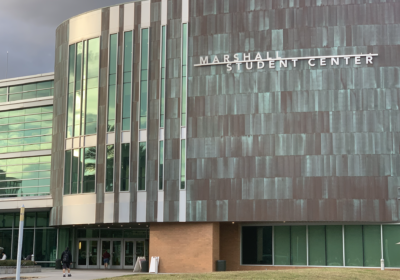Students debate concealed carry on campus

ORACLE PHOTO/ ADAM MATHIEU
Despite the 50-degree weather, nearly 100 students and faculty milled about the Marshall Student Center Amphitheatre on Wednesday night waiting for the debate to begin.
Eventually, technical difficulties were sorted through and the first Debate-a-Bull event was underway. The topic up for debate was on-campus concealed carry, which is currently a hot topic in the Florida Legislature as a bill that would allow it awaits consideration in the House.
The two teams consisting of two USF students each took the pro- and anti-concealed carry positions. Jeremy Gordon, a USF political science professor, moderated the debate.
In favor of striking the on-campus concealed carry restriction from House Bill 4001 were seniors Katrina Payne and Joshua Knezinek. Payne opened for her team with several key points.
“First of all, you must be 21 years of age or older,” she said. “For the average university student who goes into the university after high school, we’re looking at them being about 18 years old. Then, if you’re in college for four to five years, they’re going to graduate at about 22 or 23.”
She then added that concealed carry permit holders are required to pass a course that would teach them “how to carry, how to shoot, and how to properly use a weapon.” Moreover, carriers cannot be convicted of a felony.
She went on to argue that concealed weapons are important safety measures for young women who will be on their own walking at night.
Her opponent, Michael Jenkins, a junior majoring in political science, spoke next and addressed several of her arguments and added others of his own.
“(Having guns on campus) does not solve any of the issues we have, it will create a safety risk that will make the job of police and security here at USF more difficult,” he said.
He also said he believes students carrying concealed weapons allowed on campus would not realistically be able to stop a campus shooter or protect themselves because it takes many years to become a competent shooter.
Jenkins quoted an FBI report from 2000 to 2013 that stated “one in five active shooter incidents are actually stopped by someone at the scene.”
Additionally, he made the argument that the law in Florida is “notoriously lenient” in terms of getting a concealed carry permit.
As a former member of the armed forces, Jenkins said several times throughout the night that a single course wherein one must fire five rounds at a paper target is simply not enough to ease his discomfort with arming a civilian student.
Jenkins added to his argument that in 2015, there were 2,000 negligent discharges in the U.S., which means that on 2,000 occasions, a gun was discharged and the bullet hit another person.
“As of January 11, … there have been 72 accidental shootings in the United States,” he said.
Moreover, he said, concealed weapons would hinder students’ learning experiences because if a gun is accidently or intentionally fired in a building, that building — and possibly the whole campus — is shut down.
“Isn’t that the whole point of us being at the university: us getting educated?” he asked.
Jenkins, a licensed concealed carrier in Washington state, also said allowing concealed weapons on campus would hinder students’ ability to report unsafe gun carriers.
After Jenkins’ time expired, Knezinek, a finance major, began his argument. In a presentation, he said he expected to speak on the potential for an infringement of rights, natural and state laws, and the expectation for protection from University Police (UP).
Restricting on-campus concealed carry, Knezinek said, is an infringement on his rights because he, like many individuals, has not done anything wrong that would warrant such a restriction of rights. Additionally, he pointed out that guns are among the few weapons restricted on campus.
“What you may not realize is that I can lawfully carry a Taser right now; I can lawfully carry OC spray; I can lawfully carry an ASP,” he said. “But you know what, with my background in the Military Police (MP), I can tell you that I’ve been using those tools and they are not effective in lethal force situations.”
A large part of Knezinek’s argument was that in case of the need for deadly force in self-defense, guns are vital.
The former MP went on to discuss a restriction of concealed carry as an infringement of rights, according to Roman natural law and texts from John Locke.
“I have the natural right to use violence to stop violence that is imposed upon me,” Knezinek said.
Knezinek discussed his platform in more depth for ten minutes, at which point his opponent, John Wilcox, a senior majoring in political science and international studies, took the stage and began his rebuttal.
Wilcox’s time on stage was spent rebutting previous arguments made by the pro-concealed carry team, and voiced his opinion on the demographic of college students who fall victim to sexual violence.
“The majority of people who fall into the category of people who are sexually assaulted would be younger, newer members of campus, who haven’t been here very long and don’t know the safe areas of campus” he said. “Those people wouldn’t have access to their guns.”
He reasoned that people over 21 years of age know the safe parts of campus and would not fall victim to sexual violence.
“Adding guns would only make the incidents have people with guns involved in them,” Wilcox said.
Wilcox claimed 10 campus police chiefs who lobbied before the Legislature against concealed carry on campus because it would “make their jobs much (more) difficult.”
Wilcox addressed Knezinek’s argument on the infringement of rights, saying: “individuals can have a limit.”
Once both sides were able to present their arguments, a short question-and-answer session was arranged, and the audience was able to ask for clarity from each platform.
Ultimately, though the debate began with an audience evenly split on the topic, the end result dictated that the pro-concealed carry side was more influential than its opponent.
A poll taken before the debate showed that 46 percent of the audience was in favor and 46 percent was opposed, while 8 percent were undecided. At the end of the event, another poll was taken and of a pool 9 people smaller, 69 percent of the audience was in favor of concealed carry on campus. Meanwhile, 27 percent opposed concealed carry, and 4 percent were undecided.
However, Gordon emphasized that the debate was not designed to pronounce a winner, rather to open the discussion on campus.
"Regardless of winning, losing, I don't think the contest over an issue has to be a life or death issue," Gordon said. "But just the fact that students are taking control of the conversation that will effect them the most is the best thing to expect. The more student engagement that things like this garner, it's a success."






